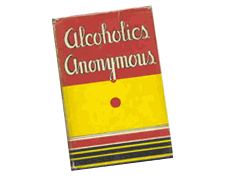Twelve Step people who study A.A.'s Big Book are, of course, familiar with Bill Wilson's medical mentor, Dr. William Duncan Silkworth. Bill called him the benign "little doctor who loved drunks." Silkworth, a psychiatrist, had treated thousands of alcoholics and was director of Towns Hospital in New York where Bill had several times sought help. Though Silkworth had explained the disease of alcoholism to Bill, Bill continued to drink until he met his "sponsor" Ebby Thacher, who had recovered through the spiritual program of the Oxford Group. Ebby had also gone to Calvary Rescue Mission, run by Dr. Sam Shoemaker's Calvary Episcopal Church in New York; and Ebby had there made a decision for Christ. Wilson went there for the same purpose and, according to a conversation the author had with Dr. Shoemaker's widow (Helen Smith Shoemaker), Bill Wilson made a decision for Christ at the Rescue Mission. Bill stayed drunk for a few days and then checked into Towns Hospital and again sought help from Dr. Silkworth. And it was during this stay, that Bill took the life-changing steps of the Oxford Group, had his "hot flash experience," reported it to Dr. Silkworth, and was told by Silkworth that he (Bill) had better hang on to what had happened to him. Silkworth later was asked to write the "Doctor's Opinion" that opens the basic text of the Big Book. Silkworth's picture appears in A.A.'s Pass It On, the biography of Bill's life.
Shortly before his death, the author spent an hour with Dr. Norman Vincent Peale, friend of A.A., the Rev. Sam Shoemaker, and Bill Wilson. Dr. Peale told me of the conversations he had with Bill Wilson about Bill's conversion. However, until 1997, I had never heard the following account by Peale about Dr. William Duncan Silkworth. It can be found in Norman Vincent Peale, The Positive Power of Jesus Christ (New York: Foundation for Christian Living, 1980), pp. 60-61. It appears under the title "The Wonderful Story of Charles K.":
Charles, a businessman in Virginia, had become a full-fledged alcoholic; so much so that he had to have help, and fast, for his life was cracking up. He made an appointment with the late Dr. William Duncan Silkworth, one of the nation's greatest experts on alcoholism, who worked in a New York City hospital [the Charles Towns Hospital]. Receiving Charles into his clinic as a patient, the doctor gave him treatment for some days, then called him into his office. "Charles," he said, "I have done everything I can for you. At this moment you are free of your trouble. But there is an area in your brain where you may hold a reservation and that could, in all likelihood, cause you to return to your drinking. I wish that I might reach this place in your consciousness, but alas, I do not have the skill."
"But, doctor," exclaimed Charles, "you are the most skilled physician in this field. When I came to you it was to the greatest. If you cannot heal me, then who can possibly do so?" The doctor hesitated, then said thoughtfully, "There is another Doctor who can complete this healing, but He is very expensive."
"That's all right," cried Charles, "I can get the money. I can pay his fees. I cannot go home until I am healed. Who is this doctor and where is he?"
"Oh, but this Physician is not at all moderate as to expense," persisted Dr. Silkworth. "He wants everything you've got. He wants you, all of you. Then He gives the healing. His price is your entire self." Then he added slowly and impressively, "His name is Jesus Christ and He keeps office in the New Testament and is available whenever you need Him."
Dr. Peale then describes the healing of Charles through the power of Jesus Christ.


